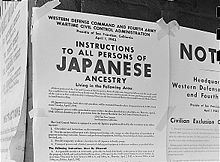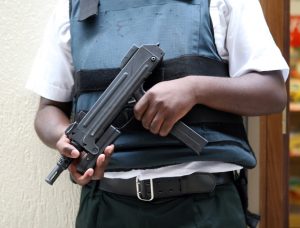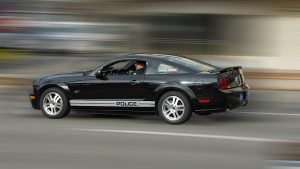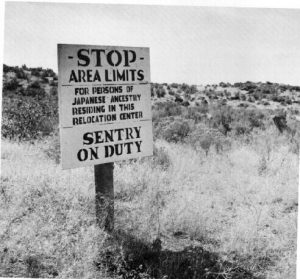
In the dilemma that he dare not remain in his home, or voluntarily leave the area, without incurring criminal penalties, and that the only way he could avoid punishment was to go to an Assembly Center and submit himself to military imprisonment, the petitioner did nothing.
June 12, 1942, an Information was filed in the District Court for Northern California charging a violation of the Act of March 21, 1942, in that petitioner had knowingly remained within the area covered by Exclusion Order No. 34. A demurrer to the information having been overruled, the petitioner was tried under a plea of not guilty, and convicted. Sentence was suspended, and he was placed on probation for five years. We know, however, in the light of the foregoing recitation, that he was at once taken into military custody and lodged in an Assembly Center. We further know that, on March 18, 1942, the President had promulgated Executive Order No. 9102, [n7] establishing the War Relocation Authority under which so-called Relocation Centers, a euphemism for concentration camps, were established pursuant to cooperation between the military authorities of the Western Defense Command and the Relocation Authority, and that the petitioner has been confined either in an Assembly Center within the zone in which he had lived or has been removed to a Relocation Center where, as the facts disclosed in Ex parte Endo (post, p. 283) demonstrate, he was illegally held in custody.
The Government has argued this case as if the only order outstanding at the time the petitioner was arrested and informed against was Exclusion Order No. 34, ordering him to leave the area in which he resided, which was the basis of the information against him. That argument has evidently been effective. The opinion refers to the Hirabayashi case, supra, to show that this court has sustained the validity of a curfew order in an emergency. The argument, then, is that exclusion from a given area of danger, while somewhat more sweeping than a curfew regulation, is of the same nature — a temporary expedient made necessary by a sudden emergency. This, I think, is a substitution of an hypothetical case for the case actually before the court. I might agree with the court’s disposition of the hypothetical case. [n8] The liberty of every American citizen freely to come and to go must frequently, in the face of sudden danger, be temporarily limited or suspended. The civil authorities must often resort to the expedient of excluding citizens temporarily from a locality. The drawing of fire lines in the case of a conflagration, the removal of persons from the area where a pestilence has broken out, are familiar examples. If the exclusion worked by Exclusion Order No. 34 were of that nature, the Hirabayashi case would be authority for sustaining it. [p232] But the facts above recited, and those set forth in Ex parte Endo, supra, show that the exclusion was but a part of an over-all plan for forceable detention. This case cannot, therefore, be decided on any such narrow ground as the possible validity of a Temporary Exclusion Order under which the residents of an area are given an opportunity to leave and go elsewhere in their native land outside the boundaries of a military area. To make the case turn on any such assumption is to shut our eyes to reality.
 This section went all the way to the United States Supreme Court in Deal v. United States 113 S.Ct. 1993 (1993), in which Mr. Deal got a bad deal at court of 105 years in prison for possessing a firearm during five bank robberies. The Court explored whether “second or subsequent offense” meant that he would have to be convicted by judgment of the first bank robbery on a date before the second or subsequent convictions. The highest Court found that these offenses could be stacked, even if all convictions happened on one judgment and from one trial. The 105 year sentence was affirmed.
This section went all the way to the United States Supreme Court in Deal v. United States 113 S.Ct. 1993 (1993), in which Mr. Deal got a bad deal at court of 105 years in prison for possessing a firearm during five bank robberies. The Court explored whether “second or subsequent offense” meant that he would have to be convicted by judgment of the first bank robbery on a date before the second or subsequent convictions. The highest Court found that these offenses could be stacked, even if all convictions happened on one judgment and from one trial. The 105 year sentence was affirmed. Sherman & Plano, TX Criminal Defense Lawyer Blog
Sherman & Plano, TX Criminal Defense Lawyer Blog





 These policies have changed the dynamics of DWI defense in Grayson and Collin County. When I started practicing, around half of DWI trials did not involve a chemical test, but now almost all of them do. Back then we would mainly argue over the performance and validity of the field sobriety testing, which we still do, and the way a person looks on video. But, the addition of chemical test evidence means that you now more than ever need a highly trained DWI lawyer like myself who has been thoroughly trained on all aspects of DWI defense. There are more technical issues in a driving while intoxicated prosecution than most other cases, including most homicides.
These policies have changed the dynamics of DWI defense in Grayson and Collin County. When I started practicing, around half of DWI trials did not involve a chemical test, but now almost all of them do. Back then we would mainly argue over the performance and validity of the field sobriety testing, which we still do, and the way a person looks on video. But, the addition of chemical test evidence means that you now more than ever need a highly trained DWI lawyer like myself who has been thoroughly trained on all aspects of DWI defense. There are more technical issues in a driving while intoxicated prosecution than most other cases, including most homicides. While on this point, people often ask whether they should take a chemical test when arrested for driving while intoxicated. Our general response as defense attorneys is NO, because there are a lot of things that can go wrong with chemical testing. Both breath testing and blood testing are inexact sciences, and there are lots of human and mechanical errors that can happen to give you a much different result than your actual blood alcohol content. The test is also completely in the hands of the State, and officers and the laboratory employees can tamper with or mishandle the evidence. Also, if your blood alcohol content is above the legal DWI limit of .08, you are only producing evidence against yourself.
While on this point, people often ask whether they should take a chemical test when arrested for driving while intoxicated. Our general response as defense attorneys is NO, because there are a lot of things that can go wrong with chemical testing. Both breath testing and blood testing are inexact sciences, and there are lots of human and mechanical errors that can happen to give you a much different result than your actual blood alcohol content. The test is also completely in the hands of the State, and officers and the laboratory employees can tamper with or mishandle the evidence. Also, if your blood alcohol content is above the legal DWI limit of .08, you are only producing evidence against yourself. However, this is not the case with a Grayson or Collin County, Texas DWI. Grayson County has a policy of no alternative charges for DWI, and I have never seen themgive a public intoxication or an obstruction of highway/passageway on a local driving while intoxicated charge. Theywould rather let a jury decide your fate than do this, which is why it is very important to hire a real DWI trial lawyer immediately if you have been arrested. The only way your case is going to “go away” without a finding of guilt on a DWI is for it to be dismissed, which is rare and is normally in the circumstances of a bad stop or arrest (brought up by a good suppression motion), or because your chemical blood alcohol test came out very well for you. Or, if you have prior military service and are admitted and complete Veterans court, you can obtain a pretrial diversion. Pretrial diversion is similar to probation but contractual, and only upon completion of the contract terms will your case be dismissed.
However, this is not the case with a Grayson or Collin County, Texas DWI. Grayson County has a policy of no alternative charges for DWI, and I have never seen themgive a public intoxication or an obstruction of highway/passageway on a local driving while intoxicated charge. Theywould rather let a jury decide your fate than do this, which is why it is very important to hire a real DWI trial lawyer immediately if you have been arrested. The only way your case is going to “go away” without a finding of guilt on a DWI is for it to be dismissed, which is rare and is normally in the circumstances of a bad stop or arrest (brought up by a good suppression motion), or because your chemical blood alcohol test came out very well for you. Or, if you have prior military service and are admitted and complete Veterans court, you can obtain a pretrial diversion. Pretrial diversion is similar to probation but contractual, and only upon completion of the contract terms will your case be dismissed. I haven’t written a DWI blog in a bit, so I think it is time to do an update. Grayson County, Texas are particularly strict jurisdictions when it comes to driving while intoxicated, but there are still ways to have a better case and a better result in your case. Grayson and Collin County District Attorneys run on a platform of strict DWI enforcement, and the counties are very Republican. So, they pays particular importance to DWI cases. But since I began practicing in 2005, I have seen some small shifts (and improvements) in the ways that driving while intoxicated is enforced in these and neighboring counties.
I haven’t written a DWI blog in a bit, so I think it is time to do an update. Grayson County, Texas are particularly strict jurisdictions when it comes to driving while intoxicated, but there are still ways to have a better case and a better result in your case. Grayson and Collin County District Attorneys run on a platform of strict DWI enforcement, and the counties are very Republican. So, they pays particular importance to DWI cases. But since I began practicing in 2005, I have seen some small shifts (and improvements) in the ways that driving while intoxicated is enforced in these and neighboring counties.

